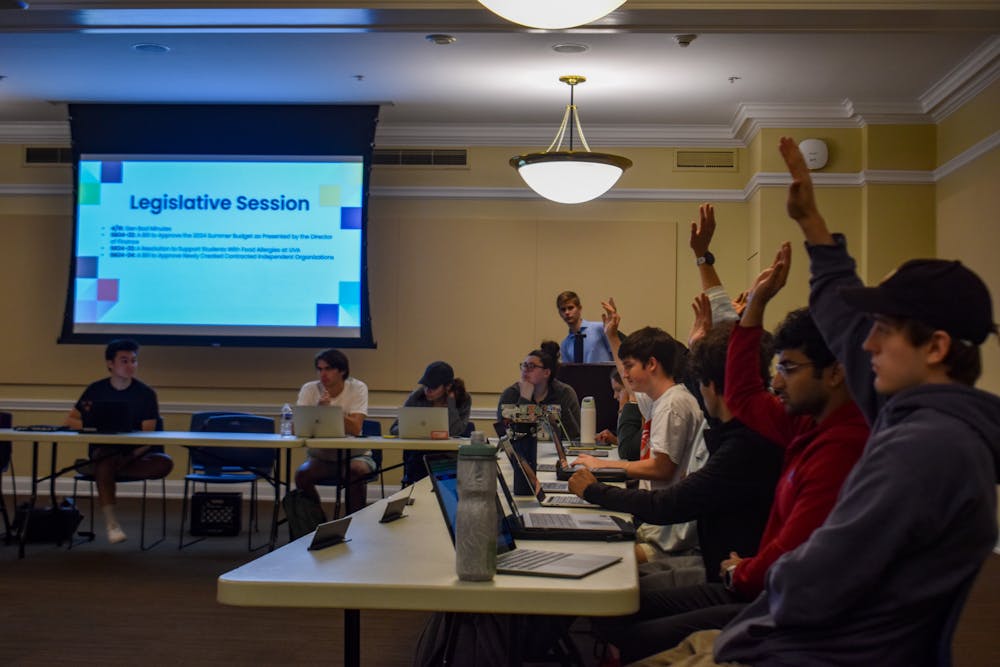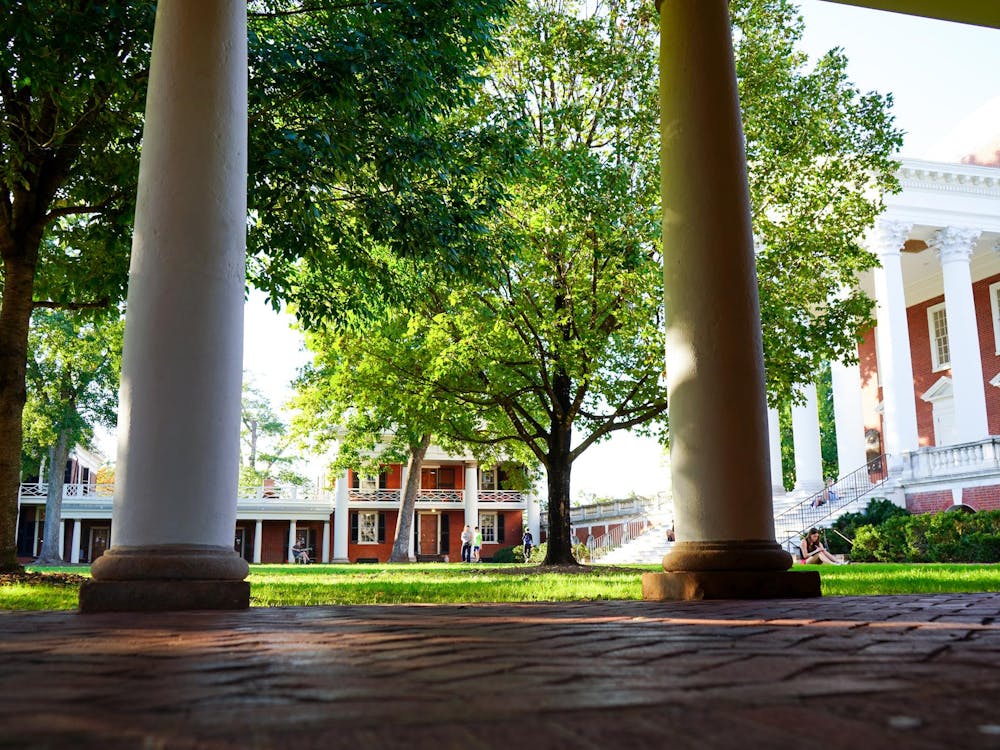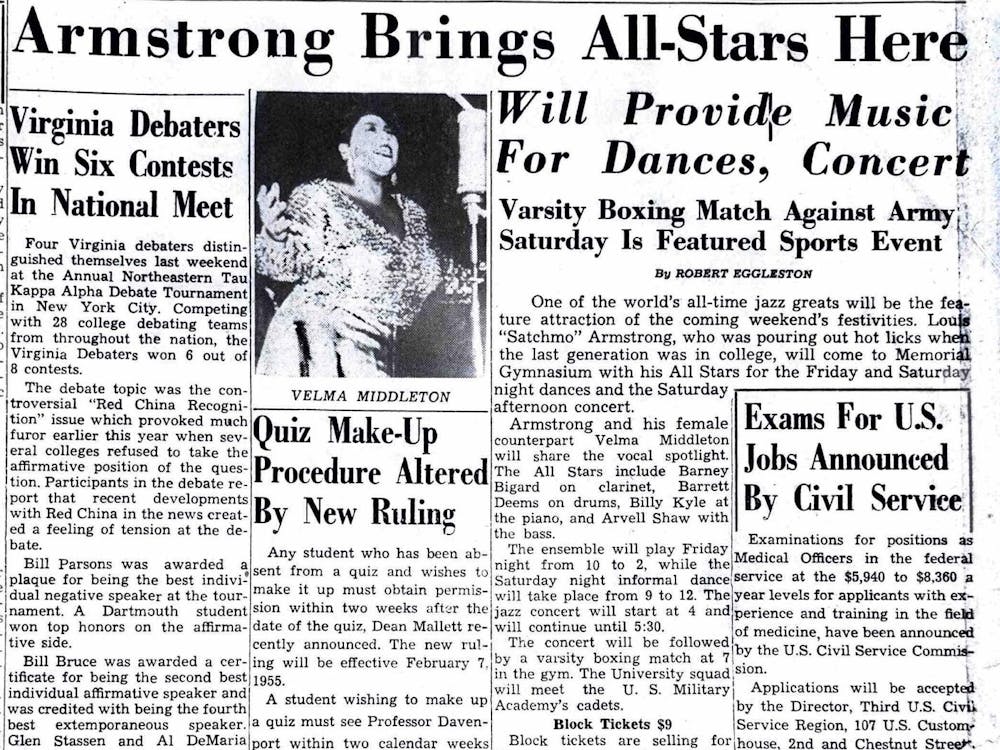Student Council unanimously voted to pass a $195,071 budget for summer 2024, a more than 100 percent increase from the 2023 summer budget. The new budget will cover a longer timeframe than the year prior, extending into September instead of August, and will use $79,942 from Student Council’s new endowment fund for allocations. Student Council also passed legislation supporting increased transparency about allergy information at University Dine locations, as well as a bill granting Contracted Independent Organizations status to eight student organizations.
Student Council reintroduced the summer budget legislation bill SB24-22, sponsored by Brookelyn Mitchell, vice president for administration and third-year College student, following discussion last week. Mitchell presented the budget on behalf of João Vitor de Andrade Lima, Student Council director of finance and second-year Batten student.
The biggest allotment categories in the summer 2024 budget are CIO Consultant funds and Support and Access Services, allocating $67,000 and $65,950, respectively. The CIO Consultants Committee, which supports student organizations on Grounds, guides CIOs through fundraising and grant processes and helps establish inter-CIO partnerships.
According to the budget document, the Committee will use the allocated funds to bolster CIO activities as new students join groups on Grounds in the Fall. SAS funding will continue to provide student services and access to programs such as the AirBus airport-transportation system and Textbook Access Office.
Funds for Student Council’s budget come from the Student Activities Fee, a $58 annual fee that is mandatory for all students and helps fund CIOs at the University, as well as non-SAF funding and Student Council’s new endowment. Roughly 58 percent of the summer 2024 budget comes from SAF funding, while non-SAF funds and endowment funds make up approximately 1 percent and 41 percent respectively.
The increased funding for the SAS branch has been an overarching goal of Student Council’s $750,000 endowment, established in the fall and supported by University President Jim Ryan’s discretionary funds. Out of the $195,071 summer budget, Student Council allocated roughly 41 percent from its endowment fund, which covered the entire budget for SAS along with executive and administrative operations, presidential cabinet agency and administrative committee expenses.
According to Mitchell, additional funding from the endowment is part of the reason the budget is significantly larger this summer, along with an extended timeframe into the next academic term.
“We’re changing our train of thought for the budget going into the new year as we want to start our initiatives a lot earlier,” Mitchell said. “That requires a [larger] budget … we’ll then use a budget that’s a little lower in terms of estimates in the fall.”
The final piece of legislation entertained during the session was SR24-23, a resolution that advocated for Student Council to call upon University Dine to implement clearer protocols and explicit strategies relating to allergen information in food.
First-year College Rep. Brian Ng, who spoke at last week’s Student Council meeting about his own experience with allergens at University Dine locations, sponsored resolution SR24-23. In his speech during last week’s meeting, Ng recalled ingesting food from University Dine location Za'atar’s Ramadan menu that caused an allergic reaction and left him hospitalized.
Two other students also testified regarding Ng’s legislation when it was originally introduced last week, speaking about their experiences navigating University Dine locations with Celiac disease and a nut allergy respectively. In his comments this week, Ng said that he does not want the changes of the resolution to burden University Dine employees, but rather to increase the availability of allergen information for students.
“[University Dine] has measures in place, but what I'm saying is that those measures, as we've seen, are not always sufficient,” Ng said. “It’s really just empowering the student to [understand] as much as they possibly can in terms of allergen information.”
Student Council tabled the resolution last week, but Ng said it is urgent to pass due to the high number of potentially affected students. He also said that the resolution simply calls on University Dine to provide students with information through labeling foods or offering a specific ‘allergens included’ list on dining apps, and does not request any funding or specific legislative action from the University.
According to Ng, the legislation would simply support his ability to start a conversation with University Dine. First-year Representatives Ian Travis and Dalton Haydel spoke in support of the resolution, stating that Ng should be supported in starting those conversations with University Dine.
“I’m fully in support of this resolution,” Travis said. “Transparency is critical … Anything we can do to represent students is necessary.”
A few representatives inquired about the differences between the resolution’s proposed plan and the current University Dine protocol, with Ng noting that while some dining locations on Grounds ask the user to indicate their allergens prior to ordering on Grubhub, this is not required universally. Student Council passed the resolution unanimously.
Student Council also passed a bill recognizing multiple organizations seeking to obtain CIO status, a designation which provides benefits to student organizations, such as access to Student Council funding through grant applications and the ability to reserve meeting spaces on Grounds.
The bill passed unanimously, officially recognizing eight new organizations as CIOs. These organizations included Bullet Journal Club, Virginia Band Tutor, Batten Asian Alliance, Humanity First Student Organization at U.Va., Latina Pathways at U.Va., Latinx Empowerment and Financial-Literacy, Checkers Club at U.Va. and History Club at U.Va.
Student Council will convene for its final meeting of the Spring 2024 semester Tuesday.







